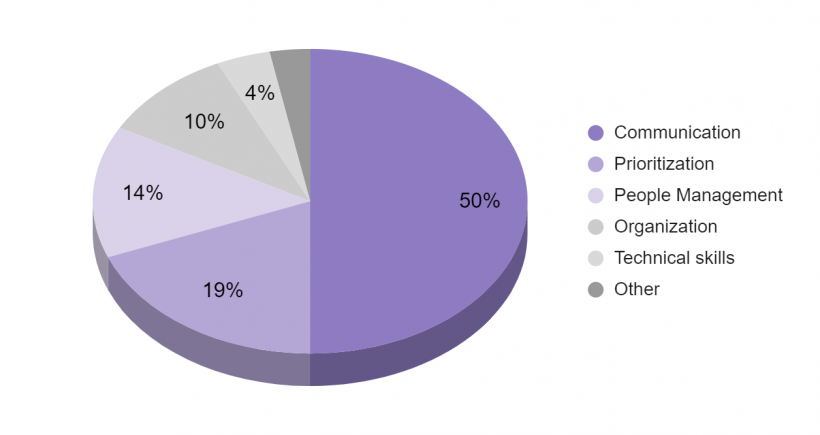
2020 was a year of rapid, unexpected changes. People had to alter their entire lifestyles, and companies had to adapt fast in order to survive.
There have also been positive changes. In recent years, we saw the role of product managers grow to prominence as organizations had to embrace the digital side of their operations. More teams have been distributed, and more businesses have put a greater emphasis on diversity. Below I've listed the top five product management trends, I anticipate, will carry into 2021 and grow bigger.
1. The Role of Product Manager Will Grow
One of the first and most noticeable trends to watch is the growth of the product manager's role, especially in the domain of adaptability, efficiency and compassionate leadership.
2020 pushed everyone to adapt quickly to new business threats such as lockdowns, enforced last-minute transition to remote work, financial pressures, and sudden changes in customer behavior. With many responsibilities, teams, and projects to coordinate, product managers are pushed to respond to external stressors patiently and intelligently, putting trust in their teams and building new processes that would function well under different circumstances. Product professionals have been identifying opportunities for new products and figuring out how they can tie into the rapidly changing market needs, a challenge from which they're only emerging better and stronger.
In 2021, product managers will continue to expand their roles beyond simply overseeing strategy and customer experience. They will direct their companies' overall product vision and make important decisions such as what marketing strategies to employ and how to better connect with colleagues, customers, and investors. They will need to utilize new tools and approaches to people in order to encourage them to focus on the most important aspects of business, share common values and feel more involved and goal-oriented. As professionals who need to see the two sides of a product - the inner (its development and engineering parts) and the outer (the market), product managers will need to adopt a big-picture perspective to run their businesses more effectively and successfully.

Most important product management skills, Product Managers in 2020 Report
2. Accelerated Transition to Digital Products
In the year of lockdowns and social distancing, we witnessed how off-line products became less accessible and desirable. More consumers drifted online, even in sectors that were previously seen as predominantly physical such as healthcare and fitness. Digital e-commerce saw its all-time highs in 2020, forcing rapid change even in countries where underdeveloped infrastructure and reluctance previously made online shopping difficult.
According to McKinsey, the share of digital customer interaction increased from 41% pre COVID to 65% post COVID.
Businesses all around the world have been accelerating their transition to the digital domain, with product managers at the helm of this strategic move. Such transformation plans had been anticipated in the previous years, but the COVID-19 pandemic expedited this shift dramatically. In 2021, I expect it to continue at a similar pace.
Furthermore, digital products will gain more weight. Quarantine restrictions pushed people to consume more products digitally including e-books, online workshops and courses, apps and various subscription bundles. To reach a greater audience of consumers product management teams should focus their vision on digital products.
3. Long-term Strategy Re-Evaluation
The post-pandemic world looks very different from what we've seen before, so simply waiting it out no longer looks feasible. What worked in 2017, or even 2019, will no longer prove functional in 2021. Product management teams will find it necessary to think beyond current circumstances and short-term goals. Instead, they'll need to re-examine their entire product strategies to adapt to new realities.
2020 brought about drastic business model changes - hotels offering day rates for WFH employees, grocery stores becoming dark fulfillment centers, and fitness companies moving workouts online. But what may look like playing defense and tackling challenges can also be viewed as huge opportunities for product managers in 2021 to integrate innovation, think out of the box, and create novel ways to steer the market and satisfy their customers.
Product professionals will become savvier, more creative and proactive in 2021 as they re-evaluate and update their strategies to deliver relevant and appealing products post-pandemic.
4. Distributed Product Teams Will Become the New Normal
Most employees won't return to offices. Companies have already evaluated the benefits of this approach such as a smaller office footprint, reduced rents and expenditures. Nearly half (47%) said they intend to allow employees to work remotely full time going forward. According to scientists, the pandemic will not end overnight. New virtual teams should be organized based on this change, while old teams should also transition to a remote or hybrid model. What this gives us is a new and more effective approach to recruiting, which enables companies to hire the most fitting and competitive talent, even if they're physically out-of-region.
In a recent Mercer survey, 82% respondents said that their companies are considering implementing flexible work at a greater scale prior to the COVID 19 pandemic.
That being said, transitioning to a fully or partially remote model requires the right tools, technologies, as well as shifts in culture and leadership to create an appealing and productive workplace for product management teams and organizations at large.
5. Diversity Will Increase
A 2015 McKinsey report found that more ethnically and racially diverse management teams were 35% more likely to have financial returns above their industry means, while more gender diverse teams were 15% more likely to have financial returns above their industry means. Why does that work? The answer is pretty simple: diverse teams are smarter. Working with colleagues who are different from you can enhance your performance, stimulate your thinking and creativity.
Diversity, equity, and inclusion (DEI) have been on companies' agenda for many years now, but 2020 provided businesses with the much-needed boost to hire diverse talent and nurture appealing, welcoming workplaces. Product managers will integrate DEI with greater effort to promote plurality in problem-solving and development. This, in turn, will propel innovation and solve more real market problems that are relevant to a much larger society.
The article is written by Maxim Savelyev, Product Manager at DFIN
* This is a contributed article and this content does not necessarily represent the views of techtimes.com









